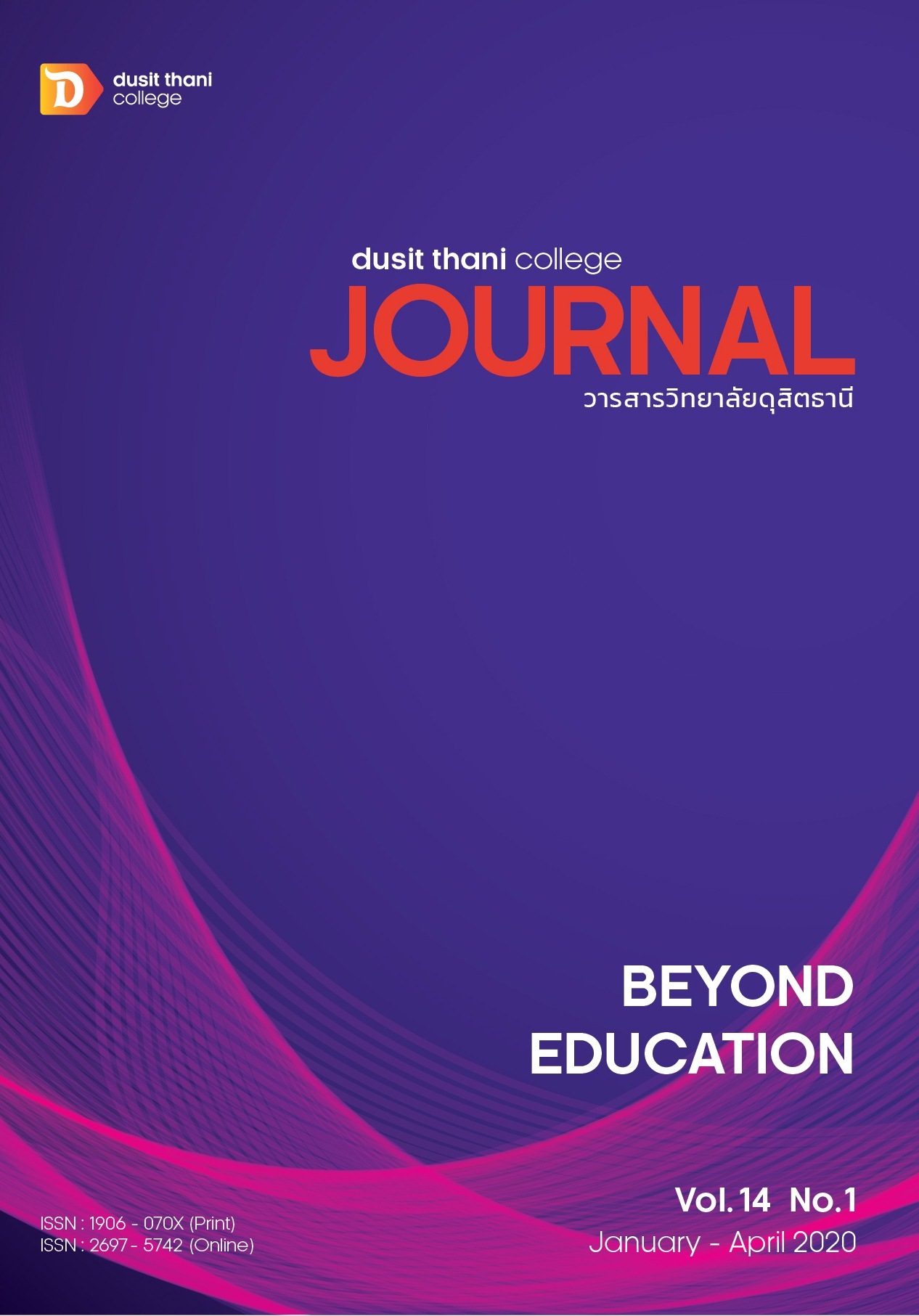อิทธิพลของข้อเรียกร้องจากงานวัฒนธรรมมุ่งผลเพื่อผู้อื่นที่ส่งผลต่อการปฏิบัติงาน ผ่านความเหนื่อยหน่ายในงานของบุคลากรโรงพยาบาลในกำกับของรัฐแห่งหนึ่ง
Main Article Content
บทคัดย่อ
การวิจัยนี้มีวัตถุประสงค์เพื่อศึกษา 1) อิทธิพลของข้อเรียกร้องในงานที่ส่งผลต่อความเหนื่อยหน่ายในงาน โดยมีวัฒนธรรมมุ่งผลเพื่อผู้อื่นเป็นตัวแปรกำกับ 2) อิทธิพลของความเหนื่อยหน่ายในงานที่ส่งผลต่อการปฏิบัติงาน การวิจัยครั้งนี้เป็นการวิจัยเชิงปริมาณ โดยใช้แบบสอบถามเป็นเครื่องมือในการเก็บรวบรวมข้อมูล ประชากรที่ใช้ในการวิจัยได้แก่ บุคลากรในภาควิชาศัลยศาสตร์ โรงพยาบาลกำกับของรัฐแห่งหนึ่ง รวมทั้งสิ้น 151 คน โดยใช้ประชากรทั้งหมดเป็นกลุ่มที่ศึกษา วิเคราะห์ข้อมูลด้วยโมเดลเชิงพหุคูณเชิงชั้น (Hierarchical Multiple Regression Model) ผลการวิจัยวัตถุประสงค์ข้อที่ 1 พบว่า 1) ความกดดันในงานมีอิทธิพลเชิงบวกกับความเหนื่อยหน่ายในการทำงานของบุคลากรอย่างมีนัยสำคัญทางสถิติ (β=0.77) 2) ความขัดแย้งระหว่างชีวิตในการทำงานและชีวิตที่นอกเหนือจากงานมีอิทธิพลเชิงลบกับความเหนื่อยหน่ายในการทำงานของบุคลากรอย่างมีนัยสำคัญทางสถิติ (β=-0.49) 3) ภาระงานที่หนักเกินไปมีอิทธิพลเชิงลบกับความเหนื่อยหน่ายในการทำงานของบุคลากร พบว่า มีความสัมพันธ์แต่สัมพันธ์แบบไม่มีนัยสำคัญทางสถิติ (β=0.05) 4) วัฒนธรรมมุ่งผลเพื่อผู้อื่นมีอิทธิพลในความสัมพันธ์ระหว่างภาระงานที่มากกับความเหนื่อยหน่ายในการทำงานของบุคลากร อย่างมีนัยสำคัญทางสถิติ และผลการวิจัยวัตถุประสงค์ข้อที่ 2 พบว่า ความเหนื่อยหน่ายในการทำงานของบุคลากรมีอิทธิพลทางลบกับผลการปฏิบัติงาน พบว่ามีความสัมพันธ์แต่สัมพันธ์แบบไม่มีนัยสำคัญทางสถิติ (β=-0.50)
Article Details
นโยบายการพิจารณากลั่นกรองบทความ
- บทความวิจัยและบทความวิชาการทุกเรื่องที่จะได้รับการตีพิมพ์ต้องผ่านการพิจารณากลั่นกรองโดยผู้ทรงคุณวุฒิ (Peer Review) ในสาขาที่เกี่ยวข้อง จำนวน 3 ท่าน/บทความ
- บทความ ข้อความ ภาพประกอบและตารางประกอบที่ลงตีพิมพ์ในวารสารเป็นความคิดเห็นส่วนตัวของผู้เขียน กองบรรณาธิการไม่จำเป็นต้องเห็นด้วยเสมอไป และไม่มีส่วนรับผิดชอบใด ๆ ถือเป็นความรับผิดชอบของผู้เขียนแต่เพียงผู้เดียว
- บทความที่จะได้รับการตีพิมพ์จะต้องไม่เคยตีพิมพ์ เผยแพร่ที่ใดมาก่อน และไม่อยู่ระหว่างการพิจารณาของวารสารฉบับอื่น หากตรวจสอบพบว่ามีการตีพิมพ์ซ้ำซ้อน ถือเป็นความรับผิดชอบของผู้เขียนแต่เพียงผู้เดียว
- บทความใดที่ผู้อ่านเห็นว่าได้มีการลอกเลียนหรือแอบอ้างโดยปราศจากการอ้างอิง หรือทำให้เข้าใจผิดว่าเป็นผลงานของผู้เขียน กรุณาแจ้งให้กองบรรณาธิการวารสารทราบจะเป็นพระคุณยิ่ง
เอกสารอ้างอิง
2. Bakker, A.B., & Demerouti, E. (2008). Towards a model of work engagement. Career
Development International, 13, 209 - 223.
3. Baron, R. M., & Kenny, D. A. (1986). The moderator-mediator variable distinction in socialpsychological research: Conceptual, strategic, and statistical considerations.
Journal of Personality and Social Psychology, 51, 1173 - 1182.
4. Dieter Zapf (2007). Emotion Work as a Source of Stress: The Concept and Development of an Instrument. European Journal of Work and Organizational Psychology, 8(1999), 371-400. https://doi.org/10.1080/135943299398230
5. Eatough, E., Chang, C., Miloslavic, S., & Johnson, R. (2011). Relationships of role stressors with organizational citizenship behavior: A meta-analysis. Journal of Applied Psychology. Advance online publication. doi: 10.1037/a0021887
6. Frydenberg, Erica; Lewis, Ramon. (1993). Coping with Stresses and Concerns during
Adolescence: A Longitudinal Study. Annual Meeting of the American.
7. Harris, O.J., & Hartman, S.J. (2002). Organizational behavior. Binghamton, New York: Haworth Press.
8. Ioannou, I & Kyriakides, L. (2006). Structuring a model for the determinants of vocational teacher burnout. Department of Education, University of Cyprus.
9. Jaruenboon, Thammanard. (2011). Assessment and screening forms for depression in
Thailand: considerations for choosing to use. Thammasat academic magazine.
10. Jones, F., & Fletcher, B. (1996). Job control and health. In M. J. Schabracq, J. A. M. Winnubst, & C. L. Cooper (Eds.), Handbook of work and health psychology (pp. 33 - 50). Chichester, England: Wiley.
11. Karasek's (1979) job demands-control model: A summary of current issues and
recommendations for future research, in Pamela L. Perrewé, Daniel C. Ganster (ed.) New Developments in Theoretical and Conceptual Approaches to Job Stress (Research in Occupational Stress and Well-being, Volume 8) Emerald Group Publishing Limited, pp.237 - 268
12. Keepbua, Chaiyut. Development of Causal Model of Burnout: Apply for Job Demand
Models. Thesis Master Degree Industrial and Organization Psychology Faculty of
Psychology, Chulalongkorn University, 2009.
13. Khlaywong, Jamchan. (1997). Relationship between personal factors Job satisfaction, job characteristics and corporate commitment of professional nurses Samitivej
Hospital. Bangkok : Thai Thesis Database.
14. Lazarus, R. S., & Folkman, S. (1984). Coping and Adaptation. In W. D. Gentry (Ed.),
The Handbook of Behavioral Medicine (pp. 282 - 325.). New York: Guilford.
15. Mark Linzer (2013). 10 bold steps to prevent burnout in general internal medicine. Journal of General Internal Medicine, https://dx.doi.org/10.1007%2Fs11606-013-2597-8
16. Maslach, C., Schaufeli, W. B., & Leiter, M. P. (2001). Job burnout. In S. T. Fiske, D. L. Schacter, & C. Zahn-Waxler (Eds.), Annual Review of Psychology, 52, 397 - 422.
17. Mc connell, The Laws of Restaurants Review and Update, Vol. 22, pp. 25-29, 1982. Available at https://doi.org/10.1177%2F001088048202200407
18. Muchinsky, P. M. (2006). Psychology applied to work: An introduction to industrial and
organizational psychology. Belmont, CA: Thomson/Wadsworth.
19. Medical Statistics Unit Mahidol University. (2016). Corporate Values Mahidol University. Retrieved on September 13, 2018from http://op.mahidol.ac.th/orpr/newhr/mahidol- corevalues/.
20. Muhammad, H. A. Hamdy, H.I. (2005). Burnout, supervisory support, and work outcomes: A study from an Arabic cultural perspective. International Journal of Commerce & Management 15(3&4), 230
21. Nonthanathon, Pipat. (2016). Corporate social responsibility management, Creating a
sustainable competitive advantage. Nonthaburi: Thinkbeyond Book Ltd,.
22. Organ, D. W. (1990). The motivational basis of organizational citizen ship behavior.
In B. M. Staw, & L. L. Cummings (Eds.), Research in organizational behavior (pp. 43 - 72).
Greenwich, CT: JAI Press.
23. Phil Johnson (2003). Reflexivity in Management Research. Journal of Management Studies, 40(5), 1279-1303. https://doi.org/10.1111/1467-6486.00380
24. Piturongkapithak, Darika. (2015). Synthesis of knowledge about work arrangement. Academic Journal of the Association of Private Higher Education Institutions of Thailand.
25. Promsaard, Umaporn. (2012). Empowerment of work Influencing the competencies of
professional nurses Private hospital In Bangkok, Journal of Public Health Sciences.
26. Rodsin, Suparee. (2006) The relationship between the encounter ability and overcome obstacles with burnout: a case study of King Mongkut's Institute of Technology North Bangkok. Thesis Faculty of Arts Department of Industrial and Organization Psychology Thammasat University.
27. Todd D. Smith (2017). Impact of work pressure, work stress and work–family conflict on firefighter burnout. Archives of Environmenttal & Occupational Health,
https://doi.org/10.1080/19338244.2017.1395789
28. Tsai, Claire I. and Klayman, Joshua and Hastie, Reid, Effects of Amount of Information on Judgment Accuracy and Confidence. Organizational Behavior and Human Decision
Processes, Vol. 107, pp. 97-105, 2008. Available at SSRN https://ssrn.com/abstract=1297347
29. Van Scotter, J. R., & Motowidlo, S. J. (1996). Interpersonal facilitation and job dedication as separate facets of contextual performance. Journal of Applied Psychology, 81(5), 525-531. http://dx.doi.org/10.1037/0021-9010.81.5.525
30. Yankelevich et al. (2012). General Job Stress: A Unidimensional Measure and ItsNon‐linear Relations with Outcome Variables. Journal of Stress and Health. online publication. doi:10.1002/smi.1413q1q1q1q1q1q1q1q1234343434343434343434343434


